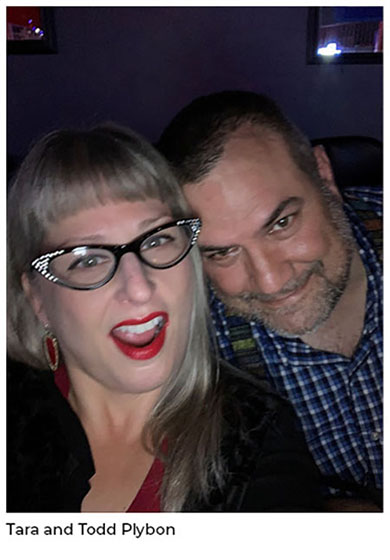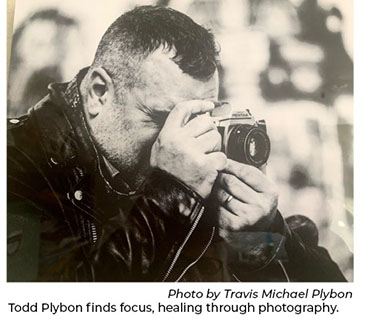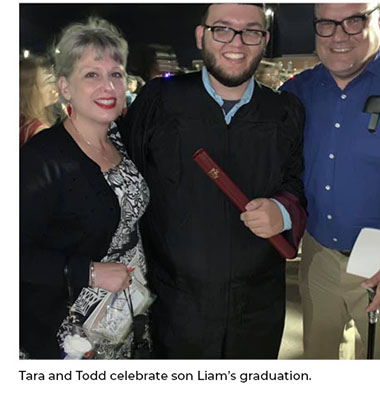Science Teacher-Turned-Soldier Finds Healing Through Horse Therapy and Photography

Todd Plybon saw some of his high school students volunteering for military service after 9/11 and felt compelled to do more. The chemistry and physics teacher was 32 at the time, had an established career in a good school district, and he and his wife Tara had a young son. He decided enlisting in the Army was the best way to protect his family’s future.
Not long after basic training, Todd was deployed to Iraq and during a second deployment he rejoined the fight in Afghanistan. On what normally would be a day to celebrate, his wife Tara received a phone call with hazy details about Todd being injured. It was their 15th wedding anniversary.
After 24 hours of anguished waiting, details started trickling in. The Humvee Todd was riding in hit an improvised explosive device (IED) and the vehicle came apart. Todd was thrown 40 feet in the air and slammed on the ground, a piece of the Humvee landing on top of him and crushing him. His unit found him, removed him from the wreckage, and did their best to stop him from bleeding to death.
Todd was stabilized, moved to Landstuhl, Germany, and then to Brooke Army Medical Center (BAMC) in San Antonio, Texas. He spent eight months undergoing surgeries to save his right leg, heal from multiple broken bones, and begin a long recovery from traumatic brain injury (TBI).
Tara was commuting more than an hour to the Fisher House, adjacent to BAMC, and juggling work and their son’s schooling when she heard about Wounded Warrior Project® (WWP). She met others who were also caring for injured veterans and eventually became a peer mentor to other caregivers. WWP opened a network of support for both Tara and Todd.
Learning to Lead Again and Capturing Beauty Through the Viewfinder
Through its Independence Program, WWP provided a case manager who assesses Todd’s needs, a recreational therapist who helps him get out of the house and engage in the community, and access to horse therapy nearby.

Equine-assisted therapy contributes to Todd’s healing and confidence and provides opportunities for shared experiences with his family and with other veterans. WWP’s Independence Program covers the cost of weekly horse therapy.
But equine therapy isn’t the only thing aiding Todd on his journey. This warrior has found photography to be a healing outlet too.
“I couldn’t go back to doing what I was doing before my injuries, so I needed something new,” Todd said. “I’d been interested in darkroom photography when I was younger, but I never had the time for it. The Independence Program was good about helping me reconnect. My recreational therapist takes me around so I can take photos, and the program paid for lessons to learn how to develop photos again; I had not done darkroom work since I was younger.”
Developing photos in a darkroom setting seems like a natural interest for a chemistry teacher. But there’s more to it. As a soldier battling post-traumatic stress disorder (PTSD), photography gives Todd a focus on something tangible that transcends chronic pain, physical challenges, and flashbacks associated with PTSD.
“I use an old camera to take photos,” Todd explained. “When I look through the viewfinder, I only think about what is on that image. I can focus, literally and figuratively.”
Healing and Moving Forward
Todd favors black-and-white photography and prefers outdoor street settings rather than a studio. He finds inspiration in the textured limestone and brown tones around his home in Texas. When he’s by himself, he might put his back against the wall to steady a shot. He leans on Tara or his recreational therapist, Danielle, when they’re accompanying him.
In addition to helping with healing, photography has also empowered Todd to find new opportunities to serve his community. With encouragement from friends and family, Todd showed and sold photos as a benefit for ROCK, the horse ranch that provides therapy for him and other veterans and young people with different abilities. His photos have been on display at local public venues as well. Todd has not only recalled skills and renewed his love of photography, but he’s also using that passion to give back and help others.
Part of the encouragement to show his photos came from a film crew that visited Todd while documenting the benefits of horse therapy.
“The horse therapy has helped him more than counseling or medications,” Tara said. She highlighted that establishing a bond with the horse requires a level of calmness that benefits the veteran and those around him. Even before the opportunity to show his photos and give back, the 35-minute drive to the horse ranch is well worth it “to see him looking content.”
After 29 years together, Todd appreciates Tara’s unconditional love and support. And Tara sees the bravery and persistence that have brought Todd this far.
“Post-injury Todd was a completely different person,” Tara said. “I have watched him work valiantly in dealing with chronic pain and with the rage that comes with PTSD. He has worked hard. I am just as proud of him today as I was when he was wearing a uniform – if not prouder.”

Another reason for mutual pride is their son Liam, now 24, who majored in physics and astrophysics. “He has a science brain like his dad,” Tara said. Both parents describe him as kind, caring, and thoughtful – traits his parents have modeled in their relationship with each other.
Throughout Todd’s healing journey, WWP and other veterans service organizations have played a role in connecting him and his family to other veterans and providing support. They want other military families to know there are resources available.
“When you’re downrange, it takes more courage to reach out for help,” Tara said. “There’s no shame in it. Being uncomfortable helps you grow.”
For Todd, the message to other veterans is simple: “You still matter.” He said servicemen and women often feel left out after a medical board process. “You still have worth as a human being even though the military may have released you,” he added. He encourages other veterans to reach out to veterans service organizations to network, find support, and explore new ways to lead.
“Especially when you’re recovering from injuries, it’s not just a community for you to find support as an individual, but also for your spouse and family to find support,” Todd said.
“I’m so grateful for the Independence Program at Wounded Warrior Project,” Tara added. “It’s been a gift to me. It’s been wonderful to have more of Todd return to me gradually during the last five years.”
Learn more about services provided by WWP’s Independence Program. Get connected today or read more about how WWP helps.
Contact: Raquel Rivas – Public Relations, rrivas@woundedwarriorproject.org, 904.426.9783
About Wounded Warrior Project
Since 2003, Wounded Warrior Project® (WWP) has been meeting the growing needs of warriors, their families, and caregivers — helping them achieve their highest ambition. Learn more.